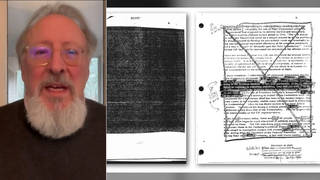
Guests
- Ted LieuDemocratic congressmember from California. He represents California’s 33rd Congressional District based in Los Angeles. He succeeded Henry Waxman, who retired after serving 40 years in Congress.
- Bill McKibbenco-founder of 350.org. He’s the author of several books, most recently Oil and Honey: The Education of an Unlikely Activist. His recent piece for The Nation is called “Exxon Knew Everything There Was to Know About Climate Change by the Mid-1980s—and Denied It.”
For decades, Exxon has publicly questioned the science of global warming, contradicting internal findings by the company’s own scientists. Recent exposés by InsideClimate News and the Los Angeles Times reveal that Exxon concealed for decades its own conclusions that fossil fuels cause global warming, alter the climate and melt the Arctic. Exxon’s climate deception is now sparking calls for a federal probe similar to that which yielded a racketeering conviction of Big Tobacco for hiding the dangers of smoking. We are joined by Rep. Ted Lieu (D-California), who is calling for a Justice Department investigation of Exxon, as well as 350.org co-founder Bill McKibben, who was just arrested for a one-man protest shutting down his local Exxon gas station. “It’s difficult to think of a company that could have set back humanity for decades, and perhaps permanently,” Rep. Lieu says. “But that’s what happened here.”
Transcript
JUAN GONZÁLEZ: We begin with the latest in the Exxon climate change cover-up that some compare to the deceptions of Big Tobacco. Recent exposés by InsideClimate News and the Los Angeles Times revealed that for decades Exxon concealed its own findings that fossil fuels cause global warming, alter the climate and melt the Arctic ice. Exxon scientists’ earliest known warnings on climate change date as far back as 1977. Toward the end of the 1980s, the company radically changed course and openly embraced climate denial. Since then, it has spent millions of dollars funding efforts to reject the climate science its own experts once advanced. Still, even as it spread climate doubt and lobbied against environmental regulation, Exxon’s denial wasn’t across the board. In internal planning kept from the public, the oil giant’s researchers and engineers incorporated climate change projections to determine how best to adapt their operations to a warming planet.
AMY GOODMAN: The bombshell news of Exxon’s climate deception is now sparking calls for a federal investigation. On Tuesday, presidential candidate Senator Bernie Sanders wrote to Attorney General Loretta Lynch urging a Department of Justice probe of Exxon. Another Democratic hopeful, former Maryland Governor Martin O’Malley, tweeted, quote, “We held tobacco companies responsible for lying about cancer. Let’s do the same for oil companies & climate change.” Two House Democrats from California, Ted Lieu and Mark DeSaulnier, also want a DOJ probe. In a letter to Lynch, they write, quote, “If these allegations against Exxon are true, then Exxon’s actions were immoral. We request the DOJ investigate whether ExxonMobil’s actions were also illegal.”
On Tuesday, the prosecutor who won the massive 2006 racketeering case against Big Tobacco for hiding the dangers of smoking agreed. Sharon Eubanks, a former Justice Department attorney now in private practice, told ThinkProgress, quote, “It appears to me … that there was a concerted effort by Exxon and others to confuse the public on climate change. They were actively denying the impact of human-caused carbon emissions, even when their own research showed otherwise. … I think a RICO action is plausible and should be considered.”
We’re joined now by two guests: Democratic Congressmember Ted Lieu of California, who co-signed that letter calling for a federal probe of Exxon, and Bill McKibben, co-founder of 350.org, one of the nation’s leading environmental activist groups. His recent piece for The Nation is “Exxon Knew Everything There Was to Know About Climate Change by the Mid-1980s—and Denied It.” McKibben was just arrested last week after staging a one-man protest at a local Exxon station, in protest of Exxon’s climate denial. He held a sign reading, “This pump temporarily closed because ExxonMobil lied about climate.”
We welcome you both to Democracy Now! Congressmember Lieu, we’ll start with you. Talk about what you’re calling for right now.
REP. TED LIEU: If the facts are true, I believe Exxon’s actions are shocking and outrageous. And it’s difficult to think of a company that could have set back humanity for decades, and perhaps permanently, but that’s what happened here. In this case, Exxon scientists knew that climate change was happening, that fossil fuels were causing climate change, and not only did they deny that and spread uncertainty and confusion about the science, they then took actions to plan and take advantage of global warming. This is beyond hypocrisy. I’m not even sure what to call it. But I do believe there should be investigation under the RICO racketeering statutes of the federal government to see if they should be prosecuted for their actions.
JUAN GONZÁLEZ: And, Congressman Lieu, what most stunned you in terms of the information that’s come out now in the recent exposés?
REP. TED LIEU: That their scientists were on the cutting edge of research on climate science, that they had done tremendous work, that they confirmed global warming was happening, and then top executives essentially shut that down and embarked on a disinformation and confusion campaign simply for profits, at the same time knowing that this could really damage all of humanity. And to me, just how shocking this was really was what stood out to me.
AMY GOODMAN: A recent investigative series by the Pulitzer Prize-winning news organization, [InsideClimateNews.org], has uncovered that decades ago Exxon was actually on the cutting edge of climate research. This is a clip from the PBS series Frontline, which partnered with InsideClimate News on the project.
NEELA BANERJEE: We found the trail of documents that go back to 1977. Exxon knew carbon dioxide was increasing in the atmosphere, that combustion of fossil fuel is driving it, and that this posed a threat to Exxon. At that time, Exxon understood very quickly that governments would probably take action to reduce fossil fuel consumption. They’re smart people, great scientists, and they saw the writing on the wall.
NARRATION: One Exxon research project outfitted an oil tanker with equipment to measure CO2 levels in the atmosphere and the ocean.
ED GARVEY: We were collecting data, the southern Atlantic, the Gulf of Mexico and the western Indian Ocean. Basically every hour, we would get several measurements. So we had—I called it a data monster.
NARRATION: Today Exxon says the study had nothing to do with CO2 emissions. But scientists involved remember it differently.
ED GARVEY: We were committed. We were doing some serious science. It was a significant budget, I would say on the scale of a million dollars a year. I mean, that was a lot of money in 1979.
AMY GOODMAN: That was Ed Garvey. From 1978 to 1983, he was a researcher at Exxon, where he helped start the company’s greenhouse gas research program. Last month, he appeared on Democracy Now! and talked about how he felt when Exxon started funding climate deniers.
ED GARVEY: I just think it was an opportunity that was missed, that having developed this knowledge in-house, Exxon was in position to lead the discussion as how to deal with the problem, and instead they really chose to deny the problem. And I think that was really a missed opportunity.
AMY GOODMAN: Again, that was Exxon scientist Ed Garvey, which brings us to Bill McKibben, who—well, Bill, it’s nice that you’re back home after your arrest at your local Exxon station for protesting the information—protesting what you’ve learned from the information that’s come out in both the Los Angeles Times series as well as InsideClimate [News]. Talk about what has most surprised you. I mean, you’re hard to surprise. You’ve been working on this issue for years now. What is most chilling, if you will, in these documents that have been released?
BILL McKIBBEN: For me, Amy, the thing that really gets me is the kind of realization that Exxon is probably the one institution on Earth that could have short-circuited this 25 years of pretend, faux debate that we’ve been having about climate change. If in 1989, when Jim Hansen from NASA had stood up before Congress and said, “Yeah, the planet is warming,” if Exxon at that point had said, “You know what? He’s right. Our internal science, which is very strong in this field, confirms everything that he’s saying. The world has a terrific problem,” well, we wouldn’t have solved global warming by now, but we’d be well on the way. We would not have engaged in a quarter-century of denial and debate. Instead, that’s precisely what Exxon funded and underwrote. The most compelling moment of that probably came in, I think, 1997, when the CEO of Exxon stood up before the most powerful people in China and told them that the planet was probably cooling and that the computer models, which Exxon was using at that very moment to guide their own investments—he told them the computer models didn’t work. This was tragic. And the results we now—
JUAN GONZÁLEZ: Bill, if I can interrupt a second, we have a clip from 1996, around that time, of the Exxon CEO, Lee Raymond, speaking about global warming. Let’s hear that.
LEE RAYMOND: Proponents of the global warming theory say that higher levels of greenhouse gases are causing world temperatures to rise and that burning fossil fuels is the reason. The scientific evidence remains inconclusive as to whether human activities affect the global climate. … Many scientists agree there’s ample time to better understand climate systems and consider policy options. So there’s simply no reason to take drastic action now.
AMY GOODMAN: We’re going to go to Bill McKibben for his response, as well as Congressmember Ted Lieu. This is Democracy Now! We’ll go to them in a minute.
[break]
AMY GOODMAN: “Global Warming,” recorded in 2009 by a group of musicians from the small island nation of Tuvalu, a country already threatened by climate change. This is Democracy Now!, democracynow.org, The War and Peace Report. I’m Amy Goodman, with Juan González. Our guests are 350.org co-founder Bill McKibben in Vermont, at home after his arrest at his local Exxon station for saying that Exxon lied, and Los Angeles Congressmember Ted Lieu. Juan?
JUAN GONZÁLEZ: Bill McKibben, before the break, we were playing that clip of the speech from the Exxon CEO. Looking back at that now, and also thinking about the reality that in a few weeks there will be a new round of international climate change talks in Paris, the impact of this scandal coming at this time?
BILL McKIBBEN: Well, look, the impact of what Exxon did has played out over 25 years and will play out over geologic time. There’s 47 people dead in the Philippines today after the record 20th strong typhoon in the Northern Hemisphere dropped four feet of rain—almost unimaginable—across the Philippines. But something like that happens every day now. We’ve melted the Arctic. We’ve changed the chemistry of the oceans. This is their legacy.
As we move forward, still trying to keep this from getting any more out of control than it is, it’s going to be incredibly important to break the power of the fossil fuel industry. That’s why there’s this huge divestment campaign, that California just joined their retirement funds in participating in. That will help begin to break their power. That’s why we do things like fight pipelines and fracking wells and things, to try and reduce their power.
But, man, if only they had told the truth to begin with. That’s why—I mean, I went to get arrested just because I was afraid that these remarkable exposés at InsideClimate News and the L.A. Times would disappear into the media clutter of our lives. This is one of the, if not the most important, investigative coups in decades. And these reporters’ remarkable work deserves to become part of the kind of common understanding of the entire planet about the most significant crisis human beings have ever wandered into.
AMY GOODMAN: Well, Bill, can you explain exactly what you did? This action was what? Last Thursday?
BILL McKIBBEN: It was last week. Amy, it was not—this was, you know, not the bridge at Selma. You know, I just sat down in front of the ExxonMobil station, not far away in Vermont, and with a very kind owner, who I was not trying to cause problems to—in fact, I gave him a hundred bucks to make up for any income he might have lost while I was blocking his pump. And eventually the police came and took me away and charged me with trespass. And all it was, you know, as I said at the time, was an effort to get people to read these stories. I’m not sure how well it worked. But later that day, my wife told me that it had been the number one trending thing on Facebook, but then, you know, a couple hours later, she told me it had been replaced by a video of a Corgi dog barking at a miniature pumpkin. So, you know, who knows? But we’re going to do everything we can, everyone who’s working on these issues, to try and make sure that this doesn’t somehow disappear.
Such gratitude to the congressman and his colleague in California, and, of course, to Bernie Sanders, for pressing hard for what needs to happen next, which is a full-on investigation by our Department of Justice—and by the departments of justice all over the world—into the conduct of this, remember, largest corporation in the world. Exxon has made more money three of the last four years than any company in the history of money, OK? So, it’s not like this is some small exception or some outlier or whatever. This is the dead-on heart of the fossil fuel industry, the people who have done everything they can to keep us from addressing climate change.
JUAN GONZÁLEZ: Well, I’d like to—you mentioned Congressman Lieu. I’d like to bring him back into the conversation. A spokesman for Exxon, Richard Keil, has rejected the allegations contained in Congressman Lieu and—in his letter to the Attorney General Loretta Lynch. Keil told The Guardian, quote, “This is complete bull-[bleep]. We have a 30 year continuous uninterrupted history of researching climate change and the LA Times for whatever reason chose to ignore that fact.” Meanwhile, Exxon continues to demand favors from the government, most recently a lifting of the long-standing ban on exporting American crude. Exxon’s vice president for public and governmental affairs, Kenneth Cohen, told The New York Times, quote, “The sooner this happens, the better for us.” Congressman Lieu, your reaction to the Exxon response to your letter?
REP. TED LIEU: The ExxonMobil spokesperson is out of his mind. He must not have read what his top executives were saying. Exxon appears now to be denying that they were denying climate change. And if you look at what your clips had shown, that’s simply not history. And I want to thank Bill McKibben for his tremendous environmental activism. And what Bill said is correct: There is an issue here not just of taking carbon out of the air—it’s a race. We need to take greenhouse gases out of the air quickly, because at some point we’re going to cross a line—and we may have already crossed it—where it’s going to be very hard to reverse the effects of climate change. And Exxon scientists knew that. They said that there were going to be catastrophic effects if we don’t stop this quickly.
AMY GOODMAN: You know, this L.A. Times piece, in addition to the InsideClimate [News] piece, is fascinating, “What Exxon Knew About the Earth’s Melting Climate”—”About the Earth’s Melting Arctic.” And it says, “Ken Croasdale, senior ice researcher for Exxon’s Canadian subsidiary, was leading a … team of researchers and engineers that was trying to determine how global warming could affect Exxon’s Arctic operations and its bottom line.” It says, from '86 to ’92, “Croasdale's team looked at both the positive and negative effects that a warming Arctic would have on oil operations, reporting its findings to Exxon headquarters in Houston and New Jersey. The good news for Exxon, he told an audience of academics and government researchers in 1992, was that 'potential global warming can only help lower exploration and development costs' in the Beaufort Sea. But, he added, it also posed hazards, including higher sea levels and bigger waves, which could damage the company’s existing and future coastal and offshore infrastructure, including drilling platforms, artificial islands, processing plants and pump stations. And a thawing earth could be troublesome for those facilities as well as pipelines.”
Now, Congressmember Lieu, this is fascinating. It could benefit Exxon because the global warming would melt the Arctic ice and open up the window for them to drill, what, three, four, five months. But, of course, it could also damage them severely.
REP. TED LIEU: I believe there needs to be a new word in the English language created for what Exxon did. They confirmed climate change was happening with their scientists, then their top executives denied it, and then they planned to take advantage of it. That is way beyond hypocrisy. They were doing all of this in the name of profits, and they set back humanity—and may have, in fact, doomed humanity. This is just one company. And it’s just very shocking that they did that.
AMY GOODMAN: So let’s talk about the parallels to Big Tobacco, what exactly a Justice Department investigation would mean. Bill McKibben has said no corporation has ever done anything this big and this bad. Congressmember Lieu, explain what happens if, as you’re calling for and the presidential candidate Bernie Sanders is demanding, an actual investigation into Big Oil, into Exxon.
REP. TED LIEU: Well, I think it’s tremendous that the former Department of Justice prosecutor who went after Big Tobacco—and won—now believes that the Department of Justice should do an investigation of ExxonMobil and Big Oil. And what happened with tobacco is the federal government used what’s called the RICO statute—it’s a racketeering statute—and they went after tobacco companies for knowing that tobacco products were causing cancer and killing people, and then denying that was happening, making profits from the products that they were selling. There’s a very good parallel here with what Exxon did. They knew that fossil fuels were causing global warming, then their top executives denied the science, spread uncertainty about it, and they profited from that. And I think the Department of Justice should investigate and then prosecute, if the facts warrant prosecution.
AMY GOODMAN: Exxon officials go to jail?
REP. TED LIEU: It would depend on what the investigation shows. But, you know, setting back humanity for decades, and maybe permanently, seems like a pretty high crime to me.
JUAN GONZÁLEZ: And, well, certainly, any kind of a Justice Department investigation or even civil lawsuits that might arise in the future would have the benefit of discovery, of being able to get at the internal records of Exxon, in terms of what the—what the executives knew, when they knew it, and what they did specifically. Bill McKibben, the prospects of that?
BILL McKIBBEN: Good reporters were able to get this much from the outside. You’re absolutely right, Juan. It’s the—that depositions and that discovery process will bring to light things that we need to know, that we deserve to know. This is like tobacco, but, in a sense, it’s much, much larger. You never had to go near a gas pump to be the victim of this particular deception. If you live in some island in the Pacific, if you live in Tuvalu or Vanuatu; or in the Maldives in the Indian Ocean; if you live on low ground in Bangladesh; if you live in the sub-Saharan Africa, where drought is now spreading; or in the Fertile Crescent, not so fertile anymore as it dries out; if you lived in Pakistan, where we saw the most epic flooding the world has ever seen in 2010; if you live in California, where we’re now ping-ponging between severe drought and once-in-a-thousand-year rainfall events that are plugging the highways with mudflows—any of these places and a million more, then you should have standing to say what Exxon did is deeply wrong. And we need to demand that they be somehow made to be part of the solution. They shouldn’t be asking for more favors, more subsidies, more lifting of the oil export ban. Instead, we should be figuring out how to make sure that they and the rest of Big Oil use the money that they’ve piled up to help fund the transition quickly to renewable energy, a transition that would have happened long ago without them in the way, without them dominating our political lives.












Media Options